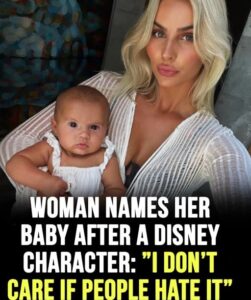Influencers Face Criticism for Naming Their Daughters “Bambi” — But Say It’s Perfect

The joy of choosing a baby’s name often comes with excitement, sentiment, and sometimes controversy. For two social media influencers—Molly-Mae Hague and Indy Clinton—that choice became the center of a heated online debate when they revealed their daughters’ names: Bambi.
The Disney-inspired choice, meant to be a term of affection and uniqueness, was quickly met with harsh words online. Critics dismissed it as “ridiculous” and even cruelly labeled it a “stripper name.” Yet both mothers remain unfazed, defending their decision as one made with love, memory, and intention.
Molly-Mae Hague’s Heartfelt Choice
In January 2023, Molly-Mae Hague, former Love Island star, and her then-partner, boxer Tommy Fury, welcomed their first child. Fans had eagerly anticipated the announcement, with speculation about the baby’s name building for weeks.
When the reveal finally came, Molly shared a tender photo of her newborn’s nursery—warm neutrals, plush teddy bears, and in soft script above the crib, the word “Bambi.”
The backlash was immediate. Comment sections filled with mocking posts and sneering jokes, many questioning how a name tied to a cartoon deer could suit a real child. The cruelest dubbed it “a brilliant stripper name.”
Molly, though hurt, stood her ground. In a candid YouTube video, she admitted the criticism had been a harsh reality check. “I was brought back down to planet Earth very quickly, of how nasty this world can be,” she said. Still, she remained proud of her decision. “I know it’s unusual and unique and not going to be to everyone’s taste… but in my mind, it’s a beautiful name.”
Tommy echoed the sentiment: “There was only ever one name for our little girl. Molly said from the time she was young that she wanted to call her daughter Bambi. And I love the name anyway.”
Though the couple has since gone their separate ways, they never wavered on their daughter’s name. To protect themselves from the online negativity, they even disabled comments on the official announcement.
Indy Clinton’s “Bambi Valentine”
Half a world away in Australia, influencer and TikTok star Indy Clinton, 25, also named her newborn daughter Bambi—adding the middle name Valentine.
Her inspiration came not from a baby-name list, but from a bedtime story. “I was reading the Bambi book to my son Navy one night,” Clinton explained. “And it just came to me. From then on, it stuck.”
At first, she considered the name Paloma. But the instant she saw her little girl, with her big brown eyes and gentle spirit, she knew “Paloma” wasn’t right. “She couldn’t be a Paloma now—she’s my Bambilicious,” Clinton said with a laugh.
Like Molly-Mae, Clinton was no stranger to the criticism that followed. The “stripper name” insult resurfaced in her comment sections too. Yet she brushed it off with confidence. “People will criticize anything these days, so at least give them something to talk about.”
She also noted that today’s baby names lean toward the creative and nature-inspired. “Bambi is going to fit right in with Rivers, Bears, Forests, Stormis, and Wolfs,” she said, referencing other unusual names embraced by celebrities.
Divisive Yet Personal
Despite the mockery, both influencers insist they have no regrets. “That is her name,” Clinton declared. “And nothing is going to change that.”
Not everyone has been negative. Many fans jumped to their defense, leaving supportive comments like:
-
“How beautiful she is! And what a gorgeous forever name you have gifted her.”
-
“So cute, love her name!”
For Molly-Mae and Indy, the choice of “Bambi” wasn’t about chasing trends or pleasing strangers online. It was about choosing a name that carried meaning, love, and joy for their daughters.
And in the end, that’s the heart of the debate: names are deeply personal. They may sound unusual to some, but to parents, they are gifts meant to last a lifetime.
Whether or not “Bambi” becomes more common in the future, for these two little girls, it will forever be tied to stories of love, resilience, and mothers who refused to let the internet define their choices.